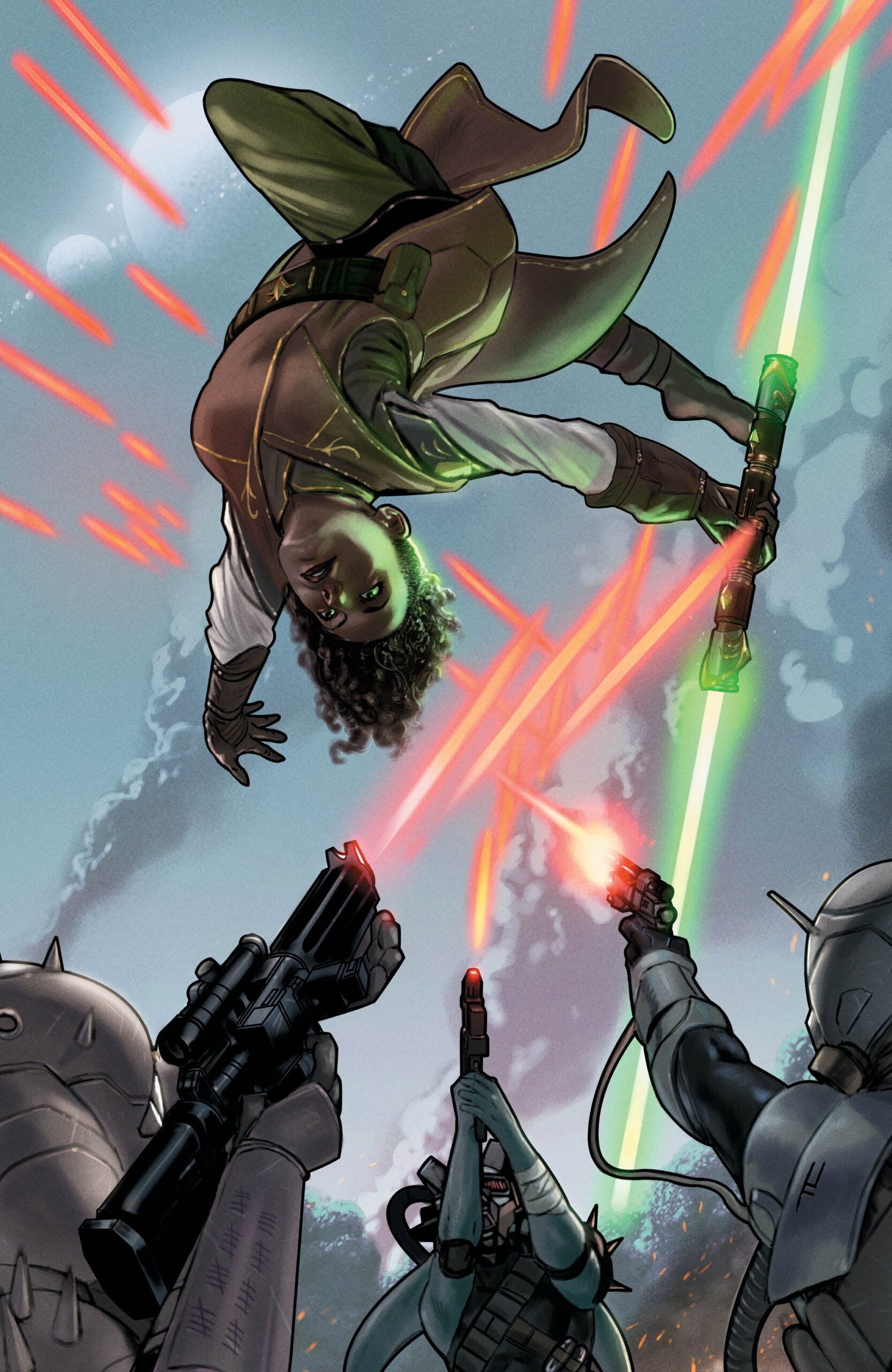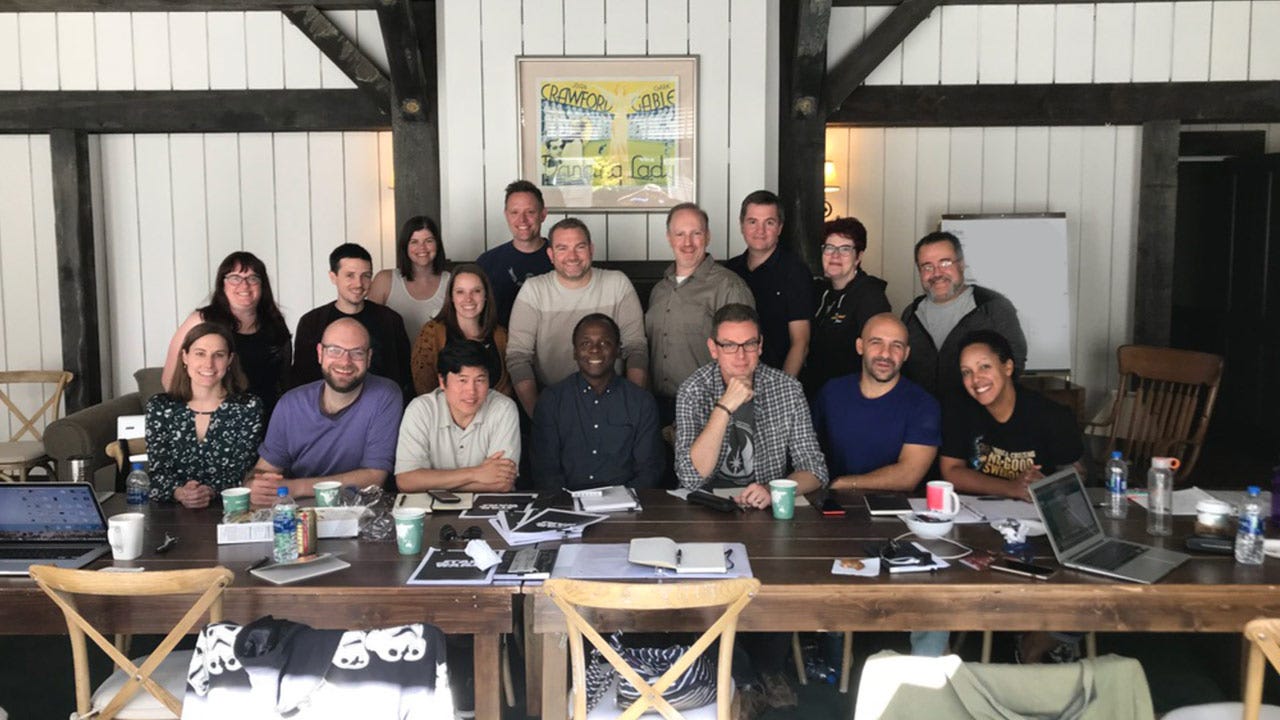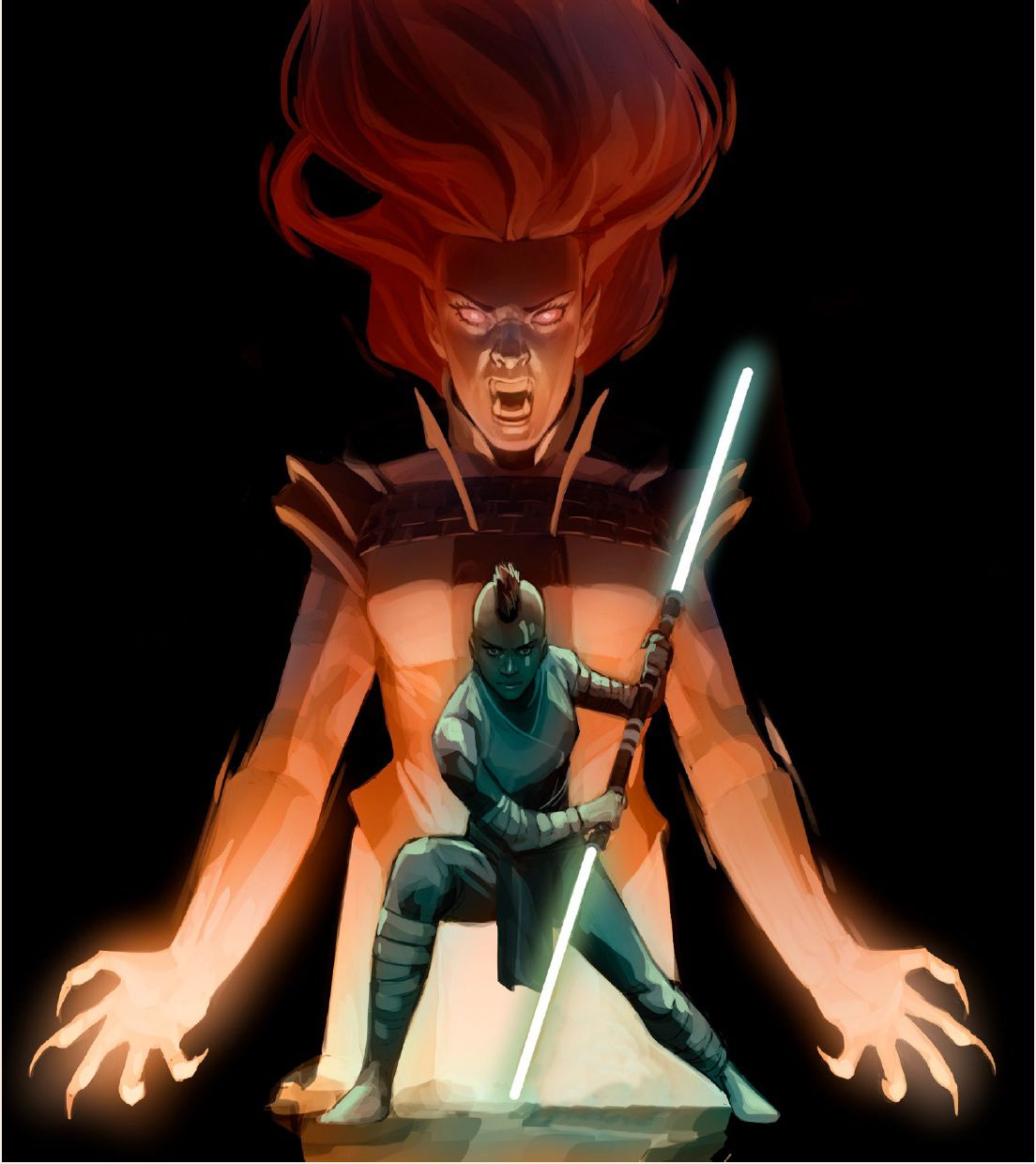10 ways to beat imposter syndrome
And how my own doubts gave birth to a Jedi!

This is Jedi Knight Keeve Trennis. She exists because I wanted to run away.

It was September 2018 and I had been invited to attend a story conference at Skywalker Ranch in California. Yes, that Skywalker Ranch.
I was with four other writers — Claudia Gray, Justina Ireland, Daniel José Older and Charles Soule — and the combined might of Lucasfilm Publishing’s editorial and Story Group. Our task… to develop a new era of Star Wars that would support years of books and comics.

Oh, nothing too daunting, then?
Are you kidding me? I was absolutely bricking it!
Everywhere I looked were master storytellers, people I respected and rated. As the conference kicked off, I glanced around at my fellow ‘story architects’, who publishing director Michael Siglain had dubbed the ‘All-Stars.’ They were all jotting down ideas as we spoke, Justina tapping on her keyboard, Charles drawing charts in a notebook, Claudia pulling narrative gems out of thin air and Daniel dancing around as he enthused about this or that story idea.
And I… I had nothing! My mind was a complete blank, and yet in two days, I would be expected to present a full pitch to the rest of the room, my vision of what this brave new era could be.
That, I realised, was when I’d be found out, when Mike and the rest of the team would understand they had made a terrible mistake. The panic was real. The air was stifling and I needed to get out!
I took my chance at the next break. While everyone gathered around the coffee machine, I made for the door, heading for the sun-drenched courtyard outside the stable house where we were working. Daniel spotted me and asked if I was okay. “Yup,” I lied. “Just need to stretch my legs.” I was out the exit before anyone could ask to join me!
My head spinning, I paced up and down the little brook to the side of the building, trying to work out what I was going to do. Would anyone notice if I disappeared into the woods and never returned? I’d probably be doing them a favour, right? Saving them the embarrassment of admitting the colossal error in judgement they’d made inviting me along.
Imposter Syndrome, that feeling that you don’t belong at the table and are about to be found out, is nothing new. Creatives have struggled with it for generations, probably ever since the first storyteller stood before a crowd and stammered: ‘once upon a time.’
It is both rational and irrational. The rational part is a fear of failure or not making the grade. It’s an incredibly natural response. The last thing anyone wants is to fall on their face in front of a load of people, especially when you’ve been given a fantastic opportunity or you’re putting your neck on the line. The irrational part is when that nagging doubt completely irradicates any empirical evidence that proves the fear to be unfounded. There, in the middle of a creative oasis created by one of my heroes, I was questioning why I had been invited to join the group, comparing myself to the others and finding myself lacking.

But the truth is that I had a proven track record. By this point, I had been writing for a long time and had a bookcase full of my novels, audios and comics back home. I had been told repeatedly by editors and readers that I ‘got’ Star Wars, understanding the saga at a granular level, that I came up with good ideas. This isn’t bragging, just the facts that led me to the Ranch, that gave me the seat at that table. The problem was that I couldn’t accept them. I was getting in the way of myself.
And that gave me an idea.
What if there was a young Jedi who struggled with the thought that she deserved a place in the Jedi Order? A young Jedi who absolutely had the ability, who had earned her right to stand alongside the finest Jedi in the galaxy but was constantly second-guessing herself, wondering if the Order had made a mistake making her a knight. What would her story look like?
And so Keeve Trennis was born. She didn’t have a name yet, or her part in what would eventually become Star Wars: The High Republic, but she had an arc. She was an idea.
She was proof I could do this!

I returned to the Stables, grabbed a coffee and got to work.
Two days later, I pitched a take that started with the question: “What scares the Jedi?”
Was that the last time I experienced imposter syndrome? Not on your nelly! It’s constantly there, at the back of my mind, sometimes smacking me right in the kisser!
But I’ve developed tactics that help keep doubts at bay, tips I hope will help you if you’re feeling the same.
TEN WAYS TO BEAT IMPOSTER SYNDROME
1. Remember, you’re not alone. Just about every creator suffers from imposter syndrome from time to time, no matter how experienced they are. I’ve been writing professionally for over 20 years. Do I suffer from it? See above for the proof. And so do many other creators. Neil Gaiman has talked about his imposter syndrome. As has Sir Paul McCartney, a flippin’ Beatle, for heaven’s sake. Even Neil Armstrong felt it, and he went to the moon! Imposter syndrome is everywhere!
2. Take a break. Walk away from your screen/notebook/whatever, even if it’s only for five minutes. Remove yourself from the pressure. Make a cup of tea. Head out for a walk. Stroke a guinea pig. Do something different. Breathe.
3. Remind yourself of your accomplishments. If you’re published, look at your past work. See that yes, you can do this and there are books/comics/artwork to prove it! If you’re not published yet, dig out some work you’re particularly proud of or that people have enjoyed. Read it again. Remember why you were pleased with it. Remind yourself that you created it!
4. Keep a praise file. This sounds exceptionally egotistical, but it helps. If someone’s praised you through an email/twitter/whatever, file it away so you can glance at it in moments of doubt. Again, it reminds you that you can do this and people like your stuff.
You don’t have to call it a praise file if that feels too much. Maybe it’s your ‘I’ve got this’ file or the ‘Look, I’m not a complete fraud’ file.
5. Turn off social media. The last thing you need is to compare yourself to others. Give yourself time away from social media so you’re not just scrolling through what everyone else is doing and feeling bad/rubbish/jealous. Remember, folk largely only project a positive image online. There’s every chance they’re feeling the same as you, no matter how glamorous or happy their Instagram appears!
6. Give yourself a theme tune. This sounds silly, but it works. When I feel nervous or unsure of myself, I play my favourite song, the same track I want to be played at my funeral: ‘Don’t stop me now’ by Queen. I can’t help but feel pumped when it’s playing. I also often pretend to be Freddie while listening, and have smashed at least one lampshade by suddenly punching the air without looking up, so please be careful@
7. Don’t expect to get everything right the first time. No one expects you to be perfect all the time. (Okay, no one but yourself!) Allow yourself to make mistakes. Mistakes are good because they can be fixed. And fixing stuff makes you feel good.
8. Celebrate your imposter syndrome. If you’re feeling out of your depth, it’s probably because you’re pushing yourself to swim further than before. That’s a good thing, so congratulate yourself. As David Bowie brilliantly said…
9. Remember, a little self-doubt is healthy. It stops you from becoming an egotistical maniac. It’s also a reminder that we’re all constantly learning. And that’s a good thing. The best thing. Keep learning! Never stop!
10. Talk to people. Find a friend, someone you trust, and tell them how you’re feeling. A problem shared and all that… And then, importantly, listen to them and allow yourself to hear that your fears are unfounded.
Actually, to that last point, why not start the conversation today? If you feel battered by imposter syndrome, hit the button below and comment. Let’s beat it together, Jedi style!

